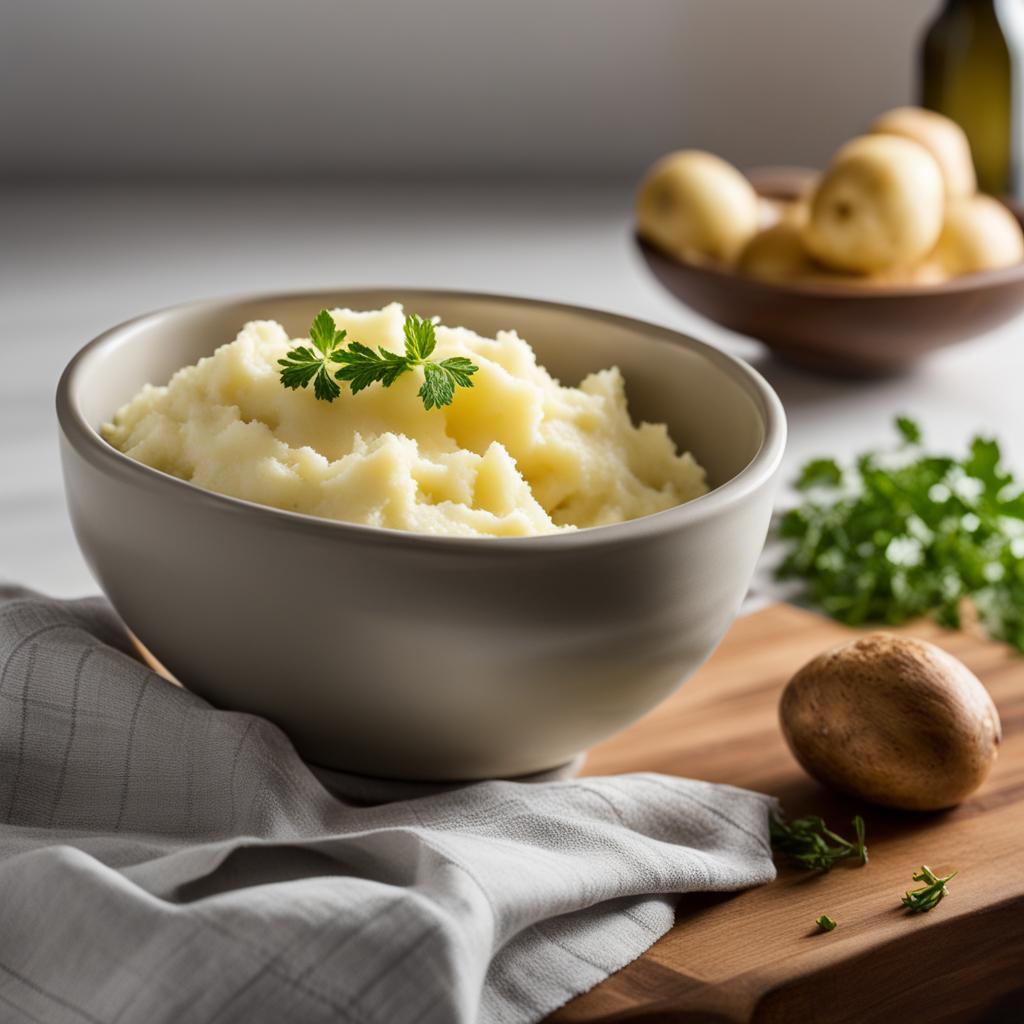Are you wondering how long mashed potatoes can last? Well, you’ve come to the right place! As a potato enthusiast and food storage expert, I’m here to guide you through the world of mashed potato longevity. Whether you’re a fan of creamy garlic mashed potatoes or classic buttery mashed potatoes, it’s important to know how long they can last to ensure you can enjoy them safely.
Leftover mashed potatoes can be a fantastic way to enjoy a delicious meal again without much effort. However, improper storage and handling can lead to spoilage and potentially ruin your mashed potato dreams. Fear not! With the right techniques, you can savor your mashed potatoes for longer and reduce food waste.
Key Takeaways:
- Leftover mashed potatoes can be stored in the refrigerator for 3-5 days.
- Mashed potatoes can be frozen for up to 12 months if properly stored in an airtight freezer-safe bag.
- Thaw frozen mashed potatoes overnight in the refrigerator for even heating when reheating.
- Storing mashed potatoes at room temperature is not safe and can lead to bacterial growth.
- Mashed potatoes can be used in various creative ways, such as making gnocchi or potato pancakes.
How Long Do Mashed Potatoes Last in the Fridge?
When it comes to storing mashed potatoes, the fridge is your best friend. Leftover mashed potatoes can be refrigerated and enjoyed for 3-5 days, as long as they are stored properly. It’s important to transfer the potatoes to an airtight container to prevent moisture loss and maintain their texture. This will help prevent them from drying out and spoiling prematurely.
If you plan on storing mashed potatoes in the fridge, make sure to cool them completely before transferring them to the container. Hot mashed potatoes can create condensation inside the container, leading to an increased risk of spoilage. Once cooled, seal the container tightly and place it in the refrigerator as soon as possible. This will help prolong the freshness and quality of the mashed potatoes.
Remember, when reheating refrigerated mashed potatoes, it’s important to do so thoroughly to ensure they are heated all the way through. This can be done in the microwave or on the stovetop with some added liquid to prevent them from drying out. By following these storage tips, you can enjoy delicious mashed potatoes even days after they were made!
How Long Can You Freeze Mashed Potatoes?
Freezing mashed potatoes is a great way to extend their shelf life and have a quick and convenient side dish on hand. When stored properly, mashed potatoes can be frozen for up to 12 months without compromising their taste and texture. Here are some storage tips to ensure your frozen mashed potatoes stay fresh:
- Cool the potatoes before freezing: It’s important to allow your mashed potatoes to cool completely before transferring them to the freezer. This helps maintain their quality and prevents the growth of bacteria.
- Use an airtight freezer-safe bag: Place the mashed potatoes in a freezer-safe bag and remove any excess air before sealing it tightly. This will help prevent freezer burn and maintain the flavor of the potatoes.
- Portion into smaller servings: Consider dividing your mashed potatoes into smaller individual servings before freezing. This allows for easier thawing and reheating when you only need a smaller portion of potatoes.
By following these storage tips, you can enjoy the delicious taste of homemade mashed potatoes even months after preparing them. Whether you’re looking to meal prep or save leftovers, freezing mashed potatoes is a convenient and practical option. Just remember to label the bags with the date to keep track of their storage time.
Table: Storage Times for Frozen Mashed Potatoes
| Storage Method | Storage Time |
|---|---|
| Airtight freezer-safe bag | Up to 12 months |
So the next time you find yourself with a surplus of mashed potatoes, don’t let them go to waste. Freeze them for later use and enjoy the convenience of having a delicious side dish ready to go whenever you need it. Just be sure to properly store and label your frozen mashed potatoes to ensure the best quality and taste.
How to Reheat Frozen Mashed Potatoes
When it comes to enjoying the deliciousness of frozen mashed potatoes, reheating them properly is key. Here are some helpful tips to ensure your reheated mashed potatoes are just as tasty as when they were freshly made.
Thawing in the Refrigerator
The best way to reheat frozen mashed potatoes is to thaw them overnight in the refrigerator. This gradual thawing process allows for even heating and helps retain the smooth texture of the potatoes. Simply transfer the frozen mashed potatoes from the freezer to the refrigerator the night before you plan to enjoy them.
Quick Reheating Methods
If you’re in a rush and need to thaw and reheat the mashed potatoes quickly, you have a couple of options. One method is to use the microwave. Place the frozen mashed potatoes in a microwave-safe dish and microwave on medium power in one-minute intervals, stirring in between, until heated through. Be sure to add a little liquid, such as milk or broth, to prevent them from drying out.
Another quick reheating method is on the stovetop. Start by thawing the mashed potatoes in the refrigerator overnight. Then, transfer them to a saucepan and heat over low to medium heat. Stir frequently and add a splash of liquid to keep them moist.
Enjoying Your Reheated Mashed Potatoes
Once your mashed potatoes are reheated, they are ready to be enjoyed as a delicious side dish or incorporated into your favorite recipes. Whether you’re enjoying a comforting family meal or hosting a gathering, reheating frozen mashed potatoes is a convenient way to savor this classic dish with minimal effort.
Can You Store Mashed Potatoes at Room Temperature?
When it comes to storing mashed potatoes, it is crucial to know the proper storage methods to ensure their freshness and safety. But can you store mashed potatoes at room temperature? The short answer is no.
Mashed potatoes, like any other cooked food, are prone to bacterial growth at room temperature. This can lead to spoilage and the risk of foodborne illnesses. To prevent this, it is best to refrigerate or freeze mashed potatoes to maintain their quality and extend their shelf life.

Refrigerating mashed potatoes is the recommended method for short-term storage. Once cooled, transfer the mashed potatoes to an airtight container and place them in the refrigerator. They can last in the fridge for 3-5 days. If you plan to store them for longer, freezing is the way to go.
By storing mashed potatoes in the freezer, you can extend their shelf life up to 12 months. Make sure to cool them completely before transferring to a freezer-safe bag or container. Portioning the mashed potatoes into smaller servings and removing excess air from the packaging can help prevent freezer burn and maintain their quality.
| Storage Method | Duration |
|---|---|
| Refrigerator | 3-5 days |
| Freezer | Up to 12 months |
Remember, always check for any signs of spoilage before consuming stored mashed potatoes. If they have an off smell, mold, or an abnormal taste, it is best to discard them to avoid any potential risks.
Making Mashed Potatoes Ahead of Time
If you’re planning a big meal or hosting a gathering, making mashed potatoes ahead of time can save you valuable time and effort on the day of the event. However, it’s important to keep in mind that homemade mashed potatoes have a relatively short shelf life. To ensure the best quality and taste, here are some storage tips for making mashed potatoes ahead of time:
Cooking and Cooling:
Before storing mashed potatoes, make sure to cook them thoroughly. Boil the potatoes until they are soft and easily mashable. Then, drain them and mash them using your preferred method. Once the mashed potatoes are ready, allow them to cool completely before storing them. This helps to prevent bacterial growth and maintain their freshness.
Storage Containers:
When storing mashed potatoes, choose airtight containers that are suitable for refrigeration. This helps to maintain the texture and flavor of the potatoes. You can use food storage containers or even resealable plastic bags. Just make sure that the containers are clean and free from any contaminants.
Refrigeration:
Mashed potatoes can be stored in the refrigerator for 3-5 days. To ensure their longevity, keep the containers tightly sealed and place them in the coldest part of the refrigerator, such as the bottom shelf or the back of the fridge. This helps to maintain a consistent temperature and prevent the growth of harmful bacteria.
| Storage Tips for Making Mashed Potatoes Ahead of Time |
|---|
| Cook the potatoes thoroughly |
| Cool the mashed potatoes completely |
| Choose airtight storage containers |
| Refrigerate the mashed potatoes for 3-5 days |
By following these storage tips, you can enjoy delicious mashed potatoes even when you’re short on time. Just remember to consume them within the recommended storage period to ensure their freshness and quality.
“Making mashed potatoes ahead of time can save you valuable time and effort on the day of the event.”
Signs of Spoiled Mashed Potatoes
Mashed potatoes are a comforting and versatile side dish that can be enjoyed in various ways. However, like any food, mashed potatoes can spoil if not stored and handled properly. It’s essential to be able to recognize the signs of spoilage to avoid consuming spoiled mashed potatoes and prevent foodborne illness. Here are the key signs to look out for:
Sour or Off Smell
One of the first signs that mashed potatoes have gone bad is a sour or off smell. If the mashed potatoes emit a strong, unpleasant odor that is different from their usual aroma, it’s a clear indication that they have started to spoil. Trust your sense of smell and discard the mashed potatoes if they have an unusual or foul scent.
Presence of Mold
Another clear sign of mashed potatoes being spoiled is the presence of mold. Mold can grow on the surface of mashed potatoes if they have been contaminated or if they have been stored for too long. If you see any green, black, or fuzzy patches on the mashed potatoes, it’s best to discard them immediately. Mold can produce toxins that can cause illness if consumed.
Abnormal Taste
If you take a bite of mashed potatoes and notice an abnormal taste, it’s a strong indication that they have turned bad. Spoiled mashed potatoes may taste rotten, sour, or generally unpleasant. Trust your taste buds, and if the flavor is off, it’s best to avoid consuming them.
Remember, consuming spoiled mashed potatoes can lead to food poisoning, which can cause symptoms like nausea, vomiting, diarrhea, and stomach cramps. To ensure your safety and the enjoyment of this delicious dish, always pay attention to these signs of spoilage and discard any mashed potatoes that show these symptoms.
Creative Ways to Use Leftover Mashed Potatoes
Don’t let your leftover mashed potatoes go to waste! There are plenty of creative and delicious ways to repurpose them into new dishes. Here are some ideas to inspire your culinary adventures:
1. Potato Gnocchi
Transform your mashed potatoes into pillowy soft gnocchi. Simply mix the mashed potatoes with flour, an egg, and a pinch of salt until a dough forms. Roll the dough into long ropes and cut it into bite-sized pieces. Boil the gnocchi until they float to the surface, then toss them with your favorite sauce for a satisfying meal.
2. Potato Pancakes
Give your mashed potatoes a crispy makeover by turning them into potato pancakes. Mix the mashed potatoes with some chopped onions, an egg, and a bit of flour. Form the mixture into patties and fry them in a pan until golden brown. Serve these crispy delights with sour cream or applesauce for a tasty side dish.
3. Shepherd’s Pie
Use your leftover mashed potatoes as a luxurious topping for a classic shepherd’s pie. Layer cooked ground meat, vegetables, and gravy in a baking dish, then spread the mashed potatoes on top. Bake until the potatoes are golden and the filling is bubbling. This comforting dish is perfect for a hearty dinner.
| Leftover Mashed Potato | Delicious Idea |
|---|---|
| 1 cup | Potato Croquettes |
| 2 cups | Mashed Potato Pizza Crust |
| 3 cups | Mashed Potato Soup |
| 4 cups | Mashed Potato Waffles |
| 5 cups | Potato Bread |
“Leftover mashed potatoes can be turned into delicious dishes that will impress your family and friends. Get creative in the kitchen and try out different recipes using your leftover mashed potatoes. You’ll be surprised at how versatile and tasty they can be!”
Remember, the possibilities are endless when it comes to using leftover mashed potatoes. Get creative, experiment with flavors, and enjoy the satisfaction of transforming a simple side dish into something new and exciting.

How to Store Store-Bought Mashed Potatoes
Store-bought mashed potatoes can be a convenient and time-saving option for quick and easy meals. However, it’s important to know how to properly store them to maintain their quality and safety. Here are some storage tips for store-bought mashed potatoes:
Refrigerate Upon Purchase
Once you bring store-bought mashed potatoes home from the grocery store, it’s crucial to refrigerate them promptly. The cold temperature of the refrigerator helps slow down the growth of bacteria and maintain the freshness of the mashed potatoes. Be sure to read the packaging for any specific storage instructions provided by the manufacturer.
Transfer to an Airtight Container
While store-bought mashed potatoes often come in convenient containers, it’s a good idea to transfer them to an airtight container before refrigerating. This helps to preserve their texture and prevent any potential contamination. Make sure the container is clean and tightly sealed to prevent moisture loss and keep the mashed potatoes fresh.
Consume Within a Few Days
Store-bought mashed potatoes should be consumed within a few days of opening. The packaging may have a “best before” or “use by” date, so be sure to check and follow those guidelines. Consuming the mashed potatoes within the recommended timeframe will ensure their optimal taste and quality.
| Storage Tips for Store-Bought Mashed Potatoes |
|---|
| Refrigerate upon purchase |
| Transfer to an airtight container |
| Consume within a few days |
By following these storage tips, you can enjoy store-bought mashed potatoes safely and ensure their deliciousness for as long as possible. Remember, proper storage is key to maintaining the quality and taste of any food item, including store-bought mashed potatoes.
Tips for Safe Food Storage
When it comes to mashed potatoes, proper food storage is essential for maintaining freshness and ensuring food safety. Here are some tips to help you store your mashed potatoes properly:
Refrigeration:
Leftover mashed potatoes should be refrigerated within two hours of cooking. Transfer them into an airtight container and place them in the refrigerator. This will help prevent bacterial growth and maintain their quality.
Freezing:
If you have a large batch of mashed potatoes that you won’t be able to consume within a few days, freezing is a great option. Before freezing, make sure the mashed potatoes have cooled completely. Portion them into smaller airtight containers or freezer bags, removing as much air as possible. Label the containers with the date and place them in the freezer. Frozen mashed potatoes can last up to 12 months.
Proper Thawing and Reheating:
When you’re ready to enjoy your frozen mashed potatoes, thaw them overnight in the refrigerator. This gradual thawing will help maintain their texture and flavor. To reheat, you can use the microwave or stovetop. Add a splash of milk or broth to prevent them from drying out. Make sure to heat them thoroughly to kill any bacteria that may have formed during storage.
By following these food storage tips, you can safely enjoy your mashed potatoes for longer periods and reduce food waste.
Mashed Potatoes for Holidays and Gatherings
When it comes to holiday meals and family gatherings, mashed potatoes are a beloved side dish that brings comfort and flavor to the table. Whether it’s Thanksgiving, Christmas, or any special occasion, serving mashed potatoes is a tradition that brings people together. But how long do mashed potatoes last for these festive occasions? Let’s find out.
When preparing mashed potatoes for holiday meals and family gatherings, it’s important to plan ahead and make enough to feed everyone. However, if there are leftovers, proper storage is key to ensure their freshness and safety. Leftover mashed potatoes can be stored in the refrigerator for 3-5 days, maintaining their taste and texture.
If you want to extend the shelf life of your mashed potatoes even further, freezing them is an option. When frozen in an airtight container or freezer-safe bag, mashed potatoes can last for up to 12 months. This allows you to prepare them in advance and have them ready for future gatherings.
| Storage Method | Duration |
|---|---|
| Refrigerator | 3-5 days |
| Freezer | Up to 12 months |
The Importance of Proper Labeling and Date Marking
When it comes to storing mashed potatoes, proper labeling and date marking are essential practices to ensure freshness and food safety. By clearly indicating the date the potatoes were prepared or stored, you can easily keep track of their shelf life and make informed decisions about when to consume or discard them.
Labeling containers with the date is especially crucial if you have multiple batches of mashed potatoes or if you store them alongside other leftovers. It helps prevent confusion and ensures you always reach for the freshest option.
The Benefits of Proper Labeling and Date Marking
1. Food Safety: Proper labeling and date marking allow you to monitor the storage time of mashed potatoes and prevent the consumption of potentially spoiled food. This helps minimize the risk of foodborne illnesses and ensures the well-being of you and your loved ones.
2. Quality Control: By keeping track of the storage duration, you can maintain the best possible quality of your mashed potatoes. It ensures that they are consumed at their peak flavor and texture, providing a delightful culinary experience.
3. Waste Reduction: Clear labeling and date marking help you avoid unnecessary food waste. By knowing the exact storage period, you can plan your meals accordingly and prioritize the consumption of mashed potatoes that are approaching their expiration date.
Best Practices for Labeling and Date Marking
1. Use permanent markers or labels that won’t smear or fade over time.
2. Write the preparation or storage date clearly on the container or label, using a legible format such as MM/DD/YYYY.
3. Place the label or write directly on the container’s lid or top surface for easy visibility.
4. Store the mashed potatoes in a clearly designated area of the refrigerator or freezer, ensuring they are easily identifiable and won’t get mixed up with other food items.
| Storage Duration | Refrigerator | Freezer |
|---|---|---|
| 3-5 days | N/A | Not recommended |
| Up to 12 months | N/A | Recommended |
Table: Recommended storage duration for mashed potatoes in the refrigerator and freezer.
Best Practices for Cooking and Storing Mashed Potatoes
When it comes to cooking and storing mashed potatoes, following best practices can help ensure their quality and safety. Here are some tips to keep in mind:
Cooking Tips:
- Choose starchy potatoes like Russets or Yukon Gold for the fluffiest mashed potatoes.
- Peel and cut the potatoes into evenly sized pieces to ensure even cooking.
- Boil the potatoes until they are fork-tender, usually around 15-20 minutes.
- Drain the cooked potatoes well to remove excess moisture and prevent watery mashed potatoes.
- For extra flavor, heat the butter and milk or cream before adding them to the mashed potatoes.
- Season with salt and pepper to taste, and feel free to add herbs or spices for additional flavor.
Storage Tips:
- Transfer leftover mashed potatoes to airtight containers while they are still warm to prevent bacterial growth.
- Store mashed potatoes in the refrigerator for 3-5 days.
- If freezing mashed potatoes, portion them into smaller servings and store in airtight freezer-safe bags or containers.
- Label and date the containers to keep track of storage times.
- Thaw frozen mashed potatoes overnight in the refrigerator before reheating.
- Refrigerate or freeze any leftovers promptly to prevent spoilage.
By following these cooking and storage tips, you can enjoy delicious and safe mashed potatoes for longer periods. Remember to always use your judgment and discard mashed potatoes that show signs of spoilage.
| Storage Method | Storage Time |
|---|---|
| Refrigerator | 3-5 days |
| Freezer | Up to 12 months |
Conclusion
In conclusion, knowing how long mashed potatoes can last is essential for enjoying them safely and deliciously. By following proper storage and handling techniques, you can maximize their freshness and quality.
When storing mashed potatoes in the fridge, make sure to use a sealed, airtight container to prevent moisture loss and maintain their texture. They can last up to 3-5 days in the refrigerator.
If you want to freeze mashed potatoes, cool them completely before portioning them into airtight freezer-safe bags. They can be frozen for up to 12 months. To reheat frozen mashed potatoes, thaw them in the refrigerator overnight for even heating and to preserve their texture.
Remember, it is not safe to store boiled mashed potatoes at room temperature for an extended period of time, as bacteria can grow rapidly. Additionally, homemade mashed potatoes should be consumed within 3-5 days of refrigeration for optimal freshness.
By following these storage tips, you can enjoy mashed potatoes for an extended period of time while ensuring their safety and taste. So, make those extra potatoes and savor the deliciousness even days after the initial meal!
FAQ
How long do mashed potatoes last in the fridge?
Leftover mashed potatoes can be stored in the refrigerator for 3-5 days in a sealed, airtight container.
How long can you freeze mashed potatoes?
Mashed potatoes can be frozen for up to 12 months in an airtight freezer-safe bag.
How do you reheat frozen mashed potatoes?
Thaw frozen mashed potatoes overnight in the refrigerator or heat them in the microwave or on the stovetop with added liquid.
Can you store mashed potatoes at room temperature?
It is not safe to store mashed potatoes at room temperature for an extended period of time. They should be refrigerated or frozen.
Can mashed potatoes be made ahead of time?
Homemade mashed potatoes can be stored in the fridge for 3-5 days, but it is recommended to consume them as soon as possible.
What are the signs of spoiled mashed potatoes?
Signs of spoiled mashed potatoes include a sour or off smell, the presence of mold, and an abnormal taste.
How can leftover mashed potatoes be used creatively?
Leftover mashed potatoes can be used in dishes like gnocchi, potato pancakes, croquettes, or even transformed into a potato salad.
How should store-bought mashed potatoes be stored?
Store-bought mashed potatoes should be refrigerated and consumed within a few days after opening.
What are some tips for safe food storage?
It is important to store leftovers in airtight containers, refrigerate or freeze them promptly, and properly reheat them before consumption.
How can mashed potatoes be enjoyed during holidays and gatherings?
Mashed potatoes can be made ahead of time and stored properly to ensure they are fresh and ready to enjoy during holiday meals and family gatherings.
Why is proper labeling and date marking important for mashed potatoes?
Proper labeling and date marking help track the freshness and safety of mashed potatoes and determine when they should be consumed or discarded.
What are some best practices for cooking and storing mashed potatoes?
Best practices include cooking potatoes thoroughly, using proper storage containers, and maintaining appropriate temperatures during storage and reheating.
Source Links
- https://leftoversthenbreakfast.com/how-long-do-mashed-potatoes-last/
- https://www.ashcroftfamilytable.com/how-long-are-leftover-mashed-potatoes-good-for/
- https://www.onceuponachef.com/recipes/creamy-make-ahead-mashed-potatoes.html
Related Recipes:
 How to Freeze Sweet Potatoes: A Guide
How to Freeze Sweet Potatoes: A Guide
 How to Cook Air Fryer Potatoes? (Perfect Step-By-Step Guide)
How to Cook Air Fryer Potatoes? (Perfect Step-By-Step Guide)
 How Many Potatoes in a Pound? (Perfect Measurement Conversion Guide)
How Many Potatoes in a Pound? (Perfect Measurement Conversion Guide)
 How to Freeze Bananas? (Perfect Step-By-Step Guide)
How to Freeze Bananas? (Perfect Step-By-Step Guide)
 How to Cut Potatoes? (Perfect Step-By-Step Guide)
How to Cut Potatoes? (Perfect Step-By-Step Guide)
 Can You Freeze Stuffing? How to Preserve the Holiday Dish
Can You Freeze Stuffing? How to Preserve the Holiday Dish
 How to Freeze Avocados? (Perfect Step-By-Step Guide)
How to Freeze Avocados? (Perfect Step-By-Step Guide)
 How to Freeze Spinach? (Perfect Step-By-Step Guide)
How to Freeze Spinach? (Perfect Step-By-Step Guide)







